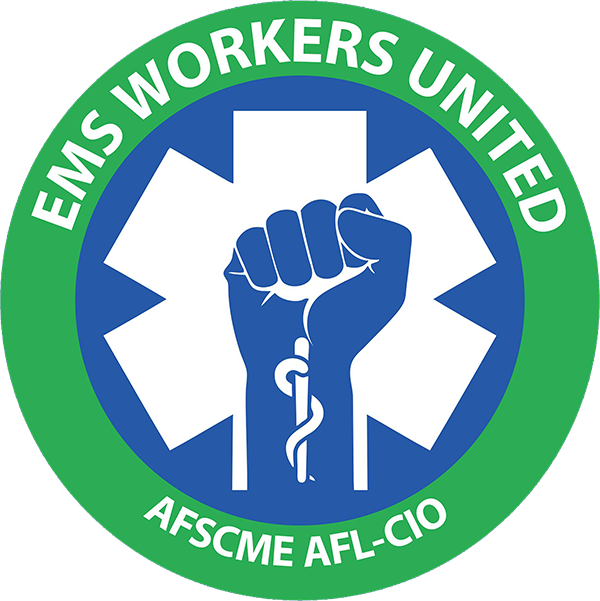Why join a union?
For our communities, our families, and our profession. With no clear federal EMS standards or guaranteed voice on the job, regulations and quality standards vary and employers often make decisions arbitrarily. By standing together as a union, we can bring improvements to EMS for our profession and the communities we serve.
Union workers have on average thirty percent higher wages and benefits than their nonunion counterparts according to U.S. Department of Labor statistics. Your union can also protect you from unjust discipline or firing by creating a grievance procedure. Almost any problem in the workplace can be resolved more effectively and fairly when you have representation.
Why are EMS professionals choosing EMS Workers United-AFSCME?
With AFSCME, we keep the power to make our own decisions about elected leadership, resources, and finances. At the same time, we have national oversight to make sure that everything runs smoothly, that leadership elections are democratic, and that resources are used to improve the EMS profession. We have the assistance necessary to train members and leaders to be effective advocates in the workplace.
What is AFSCME?
AFSCME is the American Federation of State, County, and Municipal Employees. It was started in 1932 in Wisconsin to represent state employees during the Depression. Since that time, AFSCME has grown in size and diversity. It currently represents members nationwide in private and public services. AFSCME is affiliated with the AFL-CIO. AFSCME represents EMS workers in both the public and private sectors.
Who does AFSCME represent?
AFSCME represents a wide range of dedicated public service employees across the country, including EMTs, paramedics, nurses, doctors, law enforcement officers, educators, engineers, and many others. AFSCME represents both public and private sector EMS professionals. One of the largest EMS workforces in the United States, members of the Uniformed EMTs and Paramedics of the FDNY, Local 2507, and the FDNY Uniformed EMS Officers, Local 3621, are represented by AFSCME. So are thousands of private-sector EMS professionals working in companies such as American Medical Response (AMR), Falck and various regional providers.
What kind of voice do we have in our union?
The union is a democracy. We vote to elect our stewards, bargaining team members and other leaders. Democracy and transparency ensure accountability of financial and representational matters of our union.
How can my coworkers and I join EMS Workers United-AFSCME?
You should click here and contact us. You and your coworkers will need to sign union authorization cards allowing the government to hold a union election. Once enough cards are collected, they will verify the information. No other concerned parties are informed of the card signers identity, choice or intent. All of your information is private. After the information is verified, the government will conduct an election for workers to decide whether or not they want to be a union.
Why do employers try to prevent workers from forming a union?
Employers fight back because they know when workers are united, they have the power to force employers to do the things they don't want to do, like pay fair wages, improve staffing levels and treat everyone equally. During the organizing process, it is very common for employers to hire union-busting consultants, hold mandatory meetings designed to threaten and scare employees, and engage in many other practices to divide us.
How does AFSCME advocate for political change?
Our industry is regulated by elected officials and public administrators. They determine which companies provide EMS in our communities and make decisions that affect our jobs and the work we do. That's why AFSCME is active in the political arena. Just as EMS companies lobby politicians to support their business, we need to reach out to politicians to support our profession. We have a political action fund called PEOPLE which helps us elect candidates who support EMS workers and hold them accountable once they’re in office.
All donations to PEOPLE are voluntary and private. If you have any questions about your rights regarding the fund, see Article IX, Sec 14 of the AFSCME constitution.
If I join the union, will I have to go on strike?
Strikes are the strongest tool we have, but we have many other tools. Deciding to strike is a serious decision and usually a last resort. We will only go on strike if we vote to go on strike; the decision is ours.
How does collective bargaining work?
We choose a committee of our coworkers who sit down with our employer and negotiate an agreement. This agreement is known as a collective bargaining agreement (CBA) or a union contract. The committee sits at the table with the employer as an equal and they negotiate to address the issues that we have prioritized as a group. The majority of union members must approve the agreement before it can be accepted as our contract.
